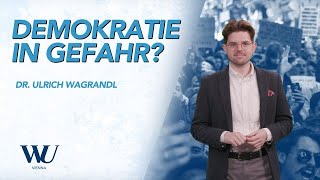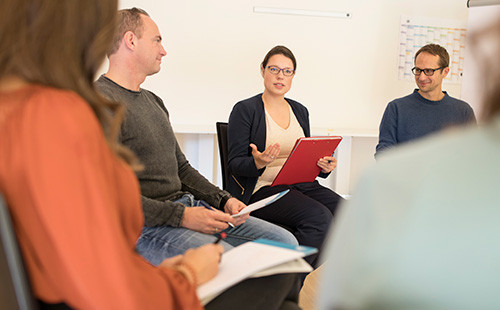Ulrich Wagrandl

Our liberal democracy is a great achievement. But democracy increasingly has to defend itself against illiberal and anti-democratic tendencies. The key question is: How can we defend against these threats without becoming what we argue against?
Ulrich Wagrandl, assistant professor at WU’s Institute for Austrian and European Public Law, addresses this question in his research. He has looked in depth at the concept of militant democracy – and at the way it has been implemented in connection with the “never again!” motto in post-World War II Austria and Germany. On the one hand, militant democracy is based on preventive measures such as education, and on the other hand, it also involves bans of assemblies, certain statements, and political parties.
But what should be banned and what do we have to put up with in the name of freedom of speech? Find out how Ulrich Wagrandl analyzes the situation and what conclusions he draws from it in our latest "Meet Our Researchers" video on YouTube. In a short conversation in his office, he talks about what fascinates him about this topic, what he is currently researching - and how Campus WU inspires him.
![[Translate to English:] Foto von Ulrich Wagrandl in seinem Büro](/fileadmin/wu/_processed_/4/1/csm_wagrandl_bearbeitet_d41008e92d.jpg)
“My work is all about reading and writing texts all day long”: The first thing that catches the eye when you enter Ulrich Wagrandl's office are the piles of books that take up virtually every available space. No wonder – he has just started working on his habilitation thesis.
You’ve done a lot of work on the concept of militant democracy (see the video). What sparked your interest in this topic?
Many years ago, during my student years, I used to have a lot of political discussions with a friend from university, discussions about all kinds of topics. At some point, we hit upon the question of whether it would be possible to abolish our democracy by democratic means – and whether parties that pursue anti-democratic goals should be allowed or banned. And this topic stuck with me. So I did some research to find out what our constitution has to say about this, and I went looking for literature on the subject. In Germany, this issue is discussed a lot, and it’s recently become a hot topic again. But I didn’t find much with respect to the Austrian context. I realized that the book I was looking for didn’t exist, and that I’d have to write it myself.
What are the goals you want to achieve with your research?
First of all, I just want to understand the world a bit better. And hopefully, my work will then help others understand the world a bit better as well. My research often looks at key terms that get thrown around a lot – the term “democracy” is a good example. And I ask myself, where do these terms come from? And do they really mean what people usually think they mean? There are many of these terms around, especially in the field of law.
Was that also the reason why you went into law?
Even as a little kid, I already knew that I wanted to study law. Why? Good question. Probably because of TV, watching court shows and legal drama series. There aren’t any lawyers in my family, and I don’t have any other legal background. But I’ve always been interested in texts and language. And that has certainly been useful, because my work is all about reading and writing texts all day long.
What are you focusing on in your current research?
I’m currently working on my habilitation thesis, which is bound to keep me busy for the next few years. In this research, I’m looking at the fundamental right to freedom of occupation and employment – in other words, the right to choose our work freely. On the one hand, this is a foundational element of individual autonomy and self-fulfillment. On the other hand, this right also has an aspect that goes beyond the individual level: If people are free to use their labor and their capital in whatever way they want, then markets and competition emerge spontaneously, as it were. In this way, our constitution rules out the kind of planned economy that was imposed in the Soviet Union. Historically, the freedom of occupation and employment also served as a means of economic policy. When it was introduced, the goal was not so much to give people more room for their self-fulfillment but rather to promote economic growth and break the power of the guilds – that was in 1867, during the heyday of liberalism in Austria. And it’s probably not a coincidence that this right has experienced a renaissance since the 1980s and the rise of neoliberalism.
What do you like about working at WU?
From day one, I felt welcome here. There’s a certain culture that you can sense at this university, where support for early-stage researchers plays an important role. At our institute, we all work together really well. I also love the campus, even though I’d like to see some more greenery.
Do you have a favorite place on Campus WU?
I’m always in awe when I enter the LC building and look up. Every single time, I think to myself, “Wow, what a cool entrance hall!”
![[Translate to English:] Foto von Ulrich Wagrandl auf dem Campus WU](/fileadmin/wu/_processed_/2/9/csm_wagrandl2_bearbeitet_83b78dbf31.jpg)
Quick facts
Position: Associate professor at the Institute for Austrian and European Public Law at WU Vienna
Age: 32 years
Born in: Vienna
Raised in: Vienna
Working at WU since: 2020
